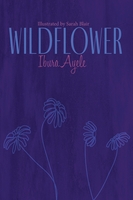Wildflower
Wildflower is a meditation on nostalgia, grief, growth, and Black womanhood. In her short collection of poems, Ibura Ayele writes about grappling with her faith and the inevitable changes one faces after a devastating loss. Wildflower is written in an accessible and graceful style meant for readers of all backgrounds to relate to in some way. Through her poetry, Ayele shows us how to see beauty and find meaning in life’s most difficult trials. This is Ibura’s first collection of poetry.
OR
Support a local bookstore by purchasing via Bookshop.org
Praise for Wildflower
Read Detailed Reviews of Wildflower
Sabrina Spence, Poet and MFA Student
“Wildflower is a beautiful and moving examination of what it is to feel and grow and all of those innately human experiences we tend to move past. Ibura writes in a way that feels familiar and warm. She centers Blackness, womanhood, and their relationship to each other and to the larger natural experience and how we encounter those life-changing moments. Speaking of those moments, she navigates them with powerful language and transparent emotion. There’s a feeling of trust in this work that makes the reader personally invested in the speaker’s journey as she navigates new landscapes and personal changes. Wildflower is a gift.”
Marla Ferguson, former Medical Social Worker, Unity Point Hospice
“As a former hospice social worker, I often was tasked with identifying reading materials for family members attending their loved ones' imminent passing. There was a dearth of books for people of color. Wildflower is a beautiful book of poetry which enters that space. It is lovingly written by a daughter in memory/honor of her mother.
It is heart wrenching from start to finish, raw, and starkly honest. It is a book that can be read time after time to allow space to consider loss, separation, and the finality of death. These are the universal themes that we all must deal with as we move through bereavement. However, the beautifully penned poems do not leave you there; it ends with hope and movement forward for this daughter to build a life without her mother physically but still a formidable presence in her life.”
Joi McClain, Slam Poet
"The preface is a spirited introduction to the identity, growth, and love that are reinforced throughout the work. I feel I got to know the author the way she got to know herself - in small, intense transformations that formed the bigger picture.
In the first section we see a tearful continuum between the woman who raised her and the woman she was raised to be; in each and all of their glory. The warm language and immersive scenes invite you to her childhood with the same warmth she was taught to invite everyone. We see the author's mother as a personal hero, and more, as a symbol of the unconditional love and undying strength within us all.
The second section is unforgiving. It stages the deep and unknowable moments of despair then rebukes them with undeniable hope, compounded through generations of black women and their joy. Through the sharpness and softness of each piece we see the author give unto herself as she relearns love, now without her mother, but with her presence nonetheless.
The third and final section of Wildflower compels the reader - after knowing the alloy formed by the souls of these women and seeing it stand the test of time - to take inventory of the things in life we will always be grateful for. The things we should be grateful for. The beauty in the writing is its impermanence, its commitment to change, and its purity of purpose as an unstoppable force.
Wildflower immortalizes love between and love within. It uses the living language of the author’s past to carry the legacy of the women who came before her. The aptly-named Wildflower is a reminder that we will grow, in spite and in light of it all."
Victoria Taylor, Top 10 CUPSI Finalist, Poet, iamsimonne.com

